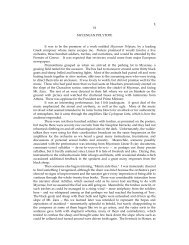LXXXI [f. 61v; Sathas VI, 202]
LXXXI [f. 61v; Sathas VI, 202]
LXXXI [f. 61v; Sathas VI, 202]
You also want an ePaper? Increase the reach of your titles
YUMPU automatically turns print PDFs into web optimized ePapers that Google loves.
minio˙tr˙I NEP Editors’ Preference 2.24—TEX–16:58 - 3/28/2008<br />
DISPACCI 283<br />
<strong>LXXXI</strong>X (1 February 1482)<br />
Most Serene Prince:<br />
Being always alert for the benefit and profit of Your Lordship’s state, as is my responsibility, about the conference<br />
and learning that the flamburar of this province, with whom I have developed a warm with Ahmed Bey,<br />
friendship for the good and convenience of this place committed to me, was coming flamburar of the<br />
Morea<br />
to this area to demolish the fortress of Argos on the command of his sultan, I wanted<br />
to forestall that, and before he arrived at Argos, I sent a messenger to him, who was<br />
Sier Nicolò Kakoyanni, 227 capo of the stratioti here, an intelligent and experienced man,<br />
a Greek, with instructions that he should congratulate him on his arrival on my behalf,<br />
and with suitable words obtain an agreement from him, if he could do so with honour,<br />
that Your Lordship might have this castello of Argos which would benefit his sultan and<br />
the flamburar and be to the advantage of the countryside, because if it is demolished,<br />
it will become a haunt of thieves and assassins from one place and another, and will<br />
be the cause of damage and scandals, with disruption of the peace, etc.<br />
This Kakoyanni went and found the flamburar at Mouchli, and related to him what I<br />
had told him. The flamburar told him that he could do nothing in the matter of Argos,<br />
because he was commanded to demolish it, and it was necessary to obey the command of<br />
his sultan. There was no way in which he could further delay any longer in carrying<br />
out the command, because the disdar, or castellan, of Argos, with the janissaries, had<br />
made many attempts and sent messages to the Porte, and the sultan did not want to<br />
change his purpose, in fact he had repeated his command to the flamburar that he should<br />
demolish everything.<br />
After he made this reply and explanation to Kakoyanni about this matter, when<br />
the latter wanted to take his leave and depart from him, the flamburar called him to one<br />
side discreetly, being alone in his tent with a young relative of his, and told Kakoyanni<br />
that he wanted to tell him a great secret, if he would swear to keep this secret and not<br />
reveal it to anyone in the world, except he must report it to me alone, with a sacred<br />
oath not to tell it to anyone. He swore an oath.<br />
Then the flamburar asked him if he knew where the brother of the Turkish sultan<br />
was. 228 He said that he did not know. The flamburar said, ‘Where is the power and wisdom<br />
of your Signoria? Report on my behalf to Misier the Provveditor, my brother, that he<br />
227 Kakoyanni: ’Bad John’, a Greek citizen of Nauplion.<br />
228 The ‘Pas¸as’ Plot’, to replace Beyazid by his younger brother, Cem, reflected a deep split between two<br />
major philosophies and alliances in Ottoman government. The professional military - including Ahmed Gedik pas¸a<br />
- supported Beyazid, a rather austere and remote personality, in opposition to the older families and e’lite who<br />
supported Cem Sultan. Cem had proposed to keep Ottoman Asia and give Beyazid Ottoman Europe, which Beyazid<br />
rejected. Cem was defeated by Gedik, went to Egypt, and after an abortive attempt to fight in eastern Anatolia,<br />
went to Rhodes to what he thought was the protection of Knights of the Hospital of St. John at Rhodes who,<br />
in August 1482, passed him on to Louis XI. Simultaneously, the Knights negotiated with Beyazid, who agreed to<br />
pay them 45,000 ducats a year to keep Cem quiet and out of Ottoman territory. Cem, fat and fond of luxurious<br />
living, was moved from castle to castle in France for 7 years, and finally transferred to Rome in 1489. At this point,


![LXXXI [f. 61v; Sathas VI, 202]](https://img.yumpu.com/6464764/22/500x640/lxxxi-f-61v-sathas-vi-202.jpg)

